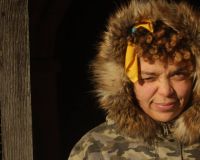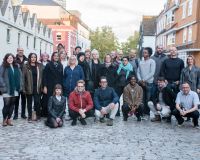Posted on Thu 17 Dec 2020
End of year inclusion thoughts
At the end of a pretty unprecedented year, I'm sharing some hopeful seeds of change.

Posted by

Jazlyn Pinckney
My work centres on implementing + evaluating thoughtful inclusion strategies to deliver impactful cultural and institutional change.Project

South West Creative Technology Network
The SWCTN is a £6.5 million project to expand the use of creative technologies across the south west of England.
Hi, I’m new(ish) around here, I’m Jazlyn one of Watershed’s Inclusion Producers.
This year has been big and tough in so many ways. I’ve needed to find a way to bring all that colour and context to my approach to Inclusion work. It has encouraged me to shift and refocus on what the road towards radical, or even slow inclusion might look like?
It’s taken me more than a moment to get my feet under the table. And I’ve spent a lot of time meeting, listening and getting to grips with the wonderful and complex world of South West Creative Technology Network (SWCTN) where my work is focussed as well as of Watershed more widely. I’ve also been working deeply with Tony Bhajam (Watershed’s Inclusion Producer working on Bristol+Bath Creative R&D) to ensure we are taking a joined-up approach.
There is so much we are discovering and ideating on, and I have big plans to share the workings out in the new year, but for now, let me talk a little about the seeds being planted.
My initial work has been centred around 3 key themes.
Data led inclusion, inclusive recruitment and conflict resolution.
This has felt really important. We are recentring inclusive practice into an already active organisation. So yes, there is work to imagine the future landscape, but we need to plot our current location first. Data led inclusion means looking at who we are, who has a seat at the table and who we are supporting so that we can intentionally and directly make paths to readdress inequities.
There is lots more to say about this, including the set-up of an inclusive data working group (affectionately known as The Data Alliance), organisation-wide surveying that looks deeply and honestly at the company’s demographics and a determination to keep data collection consensual and transparent. We have also dedicated time to thoughtful work about how we ask questions, including researching best practice from across the arts, culture, academic and government sectors.
In the new year, I will be releasing the SWCTN demographic statistics on the website, which we are using now to help us programme the remainder of the project and Watershed will be sharing data about its staff, board and the Pervasive Media Studio community.
-
Inclusive recruitment
Tony Bhajam and Jo Lansdowne have led on rethinking - no, better yet, reimagining - what a more accessible and inclusive recruitment process for staff could be. Read more about that process and the findings here. I worked with the Creative Technology team at Watershed to consider how we could best support those considering applying by opening bookable pre-application check-ins. The focus was to help potential candidates talk through their transferable skills both professionally and wider and to consider the value and fit they had with the role.
I found it interesting to break down what we think a candidate will come with and be open to the incredible value that alternative experiences bring when we let ourselves see them.
I’ve been lucky enough to work alongside Natalie Nzeyimana to start to plant some seeds of what justice work might look and feel like. This is the hardest area for me to share my workings as it’s conversations and concepts I am only just beginning to understand and feel on a personal level. But I can share with you the inception of the idea, which was ‘How do we emotionally respond to conflict, especially around inclusion issues?’ I’m interested in how we as humans, who are soft, and delicate and defensive of our missteps – how do we process, learn, grow and heal in moments of real tension?
It was with this founding idea that Natalie and I began to think about fusing both the process of a company procedure and the practice of restorative justice into a potential solution.
This is a long road, and we are finding many more questions than answers at the moment, but we are excited to share much more of our deeper learnings in the new year.
For now, I just wanted to say that for me, surprisingly, the hardest part of this exciting and intentional inclusion development, is allowing myself to share the workings out. So, as I’ve promised much more of that in the new year, know that this is the first of many more, showing the workings out on the long road to more equitable and just inclusion work.